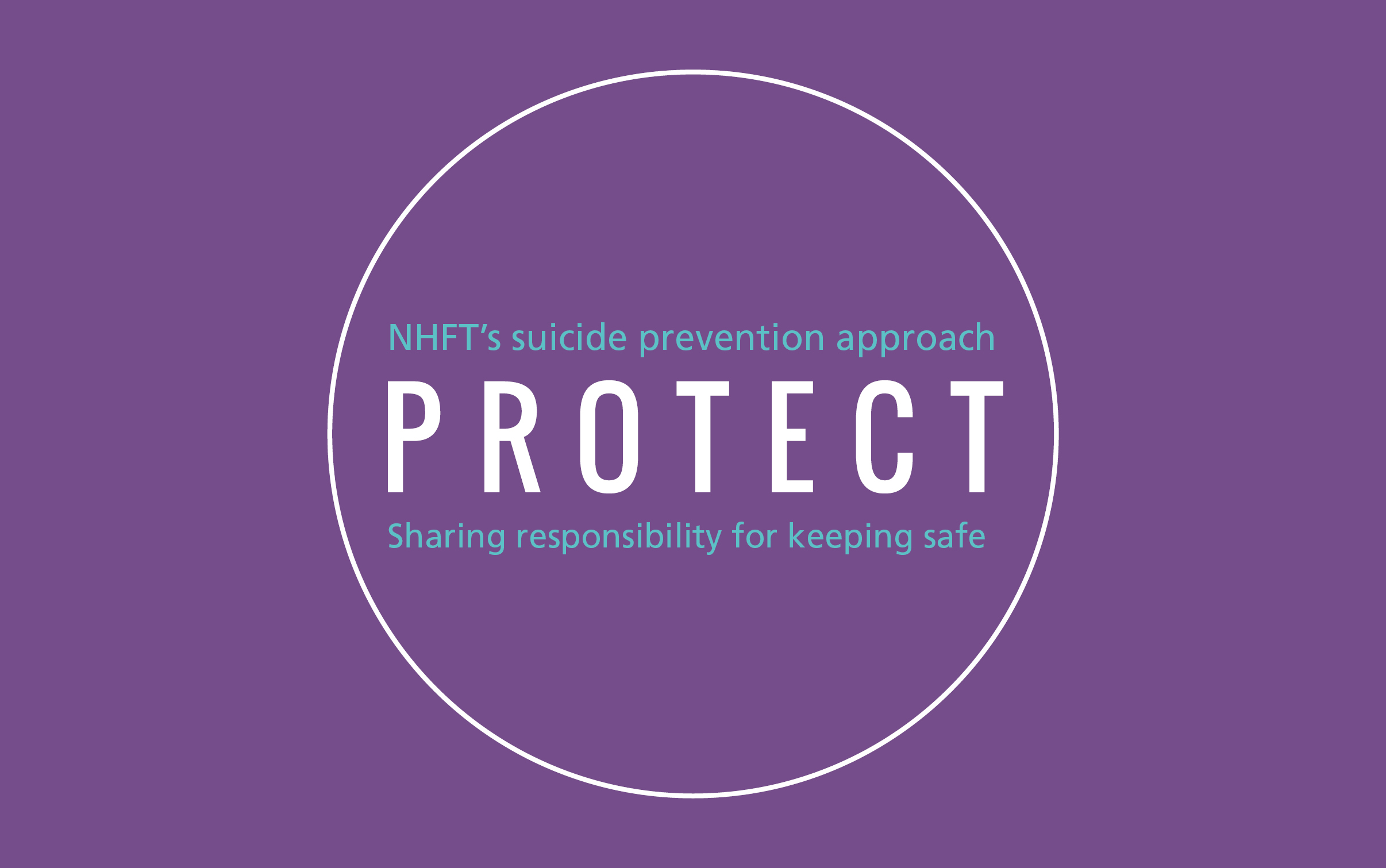World Suicide Prevention Day NHFT blog

Today, 10 September 2018, is World Suicide Prevention Day. Across the globe, a whole range of individuals, communities, charity organisations, and service providers of different kinds are thinking about how they can contribute to preventing suicide. In NHFT, as a provider of a range of services including community and mental health, we wanted to recognise this day, and to share some thoughts and resources to help in the collective effort to reduce suicide in our community.
In the UK, The Office of National Statistics has just released the latest data relating to suicide in 2017. During 2017, there were 5,821 suicides registered. This equates to a rate of 10.1 deaths per 100,000 population. This is one of the lowest rates recorded since records began in 1981. While this is encouraging, there is more to be done. Many more people still die from suicide than from road traffic accidents for example, and suicide is the most common cause of death for men aged 20-49 in England and Wales. More importantly every suicide is a tragic loss of life, and the effects can be devastating. Behind every statistic there is a personal story, and every suicide is one too many.
What makes people want to end their life?
Most people who have suicidal thoughts or who go on to act on those thoughts do not want to die. Typically people are in intense psychological and emotional pain, and can see no other solution. They have often lost hope, and feel trapped by their situation or feelings. Suicide is often a desperate attempt to solve the problem the person is faced with – whether this is a difficult situation in their own lives or painful feelings and emotions. Suicidal thoughts often start in reaction to difficult events in our lives. These can be as varied as life itself, but common examples include the breakup of a relationship, bereavement, financial difficulties, the loss of a job, chronic pain or other physical health difficulties, bullying or stress at work or school, or exam pressures. It is important to understand that having suicidal thoughts is not in itself a mental health problem. While having a mental health problem like depression might make us more vulnerable to having these kinds of thoughts it is not the cause.
We also know some groups of people are more at risk of dying from suicide. For example, men account for 75% of all suicides in the UK, and this has been the case since the mid-1990s. This is particularly true for middle-aged men. Other groups are also at higher risk – for example people with a history of drug or alcohol abuse, people experiencing mental health difficulties, people who are unemployed, and people who feel socially isolated are all more at risk. However, anyone can be affected by suicidal thoughts, and although certain groups are more at risk, the vast majority of them do not go on to take their own lives.
What can help or make a difference?
First and foremost it is important to understand that effectively preventing suicide is a whole community approach. Everyone has a role to play and potentially each and every one of us can make a difference in a whole range of different ways.
Although there are some encouraging signs of change, talking about suicide is often still a taboo subject in our society. People often feel ashamed and stigmatised if they have suicidal thoughts, and those around them are often afraid to ask or talk about suicide. We may feel uncomfortable or afraid of saying the wrong thing or making it worse. If as a whole community we can begin to talk about suicide more openly, and feel less afraid to ask and talk about suicide then we will begin to reduce this stigma and make it easier to reach out for help.
On our Twitter feed today we have explored a number of different myths about suicide. One of the fears is that we will somehow get it wrong, or make it worse, and therefore you need to be a highly trained professional to even begin the conversation about suicide with someone. While training can be helpful, we would encourage you all to reach out to a person you are worried about. Many people who have experienced suicidal thoughts or behaviour say that it was the kindness, compassion and humanity of those around them that made the difference. Often people experiencing suicidal thoughts say that they feel isolated, uncared for and cut off from the world around them. We don’t need special training to show people that we care about them, that we are willing to listen and to push through the taboo of talking about suicide.
More specifically, it can also be helpful to develop a “safety plan”, or to help someone else to do this. While we may experience suicidal thoughts over a short or longer period of time, research tells us that the urge to act on these thoughts usually only lasts for the relatively short time of a few hours. If we can make a plan to help us hang on, and keep safe during these times, we can help someone stay safe from suicide. There are a number of resources below that can help with this, and the “Stay Alive” app includes a digital version of a safety plan that can be done individually or with the support of someone else.
At a broader level, you can also support World Suicide Prevention Day. The idea of the day is to get people talking and thinking together about what we can do as communities to help prevent suicide. There are many excellent ideas on the website, which you find here: https://iasp.info/wspd2018/.
If you are interested in more specific suggestion as to what can help or make a difference we have also collected together some specific resources together below. This includes a link to a free 20-minute online training which can help you feel more confident in speaking to someone about suicide.
Useful resources
We wanted to take this opportunity to share some useful resources. Many of these have been developed by other organisations and individuals. If you need urgent help, please do follow the advice on our website here: https://www.nhft.nhs.uk/help. We now also operate crisis cafes in partnership with MIND where you drop in without the need for an appointment: https://www.nhft.nhs.uk/crisis-cafe.
Help for people experiencing suicidal thoughts
Stay Alive App: This is an excellent, award-winning application for your mobile phone. It includes a digital version of a “safety plan” as well as coping strategies, helpline numbers, and other useful information. It was developed by Grassroots Suicide Prevention, a charity based in Brighton and is available here.
Feeling overwhelmed: Helping you stay safe leaflet: A leaflet from the Royal College of Psychiatrists for anyone struggling to cope when bad things have happened in their lives. It is available here.
U Can Cope leaflet: Also from the Royal College of Psychiatrists designed to help young people develop the ability to cope with difficulties in their life, available here.
MIND Guide to Suicidal Feelings: Webpage and downloadable leaflet offering help and guidance about suicidal feelings, available here.
Help for families, carers and people supporting someone with suicidal thoughts
Samaritans guide if you are worried about someone: link here.
MIND Guide to supporting someone who is suicidal: link here.
Video Clips to Help Inspire Hope
These clips are from people who have personal experience of recovering from suicidal thoughts and behaviour. They can be a powerful way of inspiring hope that recovery is possible, and also learning about what helped them:
Kevin Hines: This is the story of a man who jumped off the Golden Gate Bridge in the USA, but w subsequently survived and has now gone onto campaign about mental health and suicide prevention, available here.
Jonny Benjamin: Jonny was the subject of a Channel 4 documentary called “The Stranger on the Bridge” which focuses on how he was helped when in a suicidal crisis by a passer-by. They were eventually reunited and now campaign on mental health together. Available here.
A collection of stories of people who have recovered from suicidal thinking by the Samaritans and Royal College of Psychiatrists, available here.
Free online suicide prevention training
As mentioned above, there is free suicide prevention training available, developed by the Zero Suicide alliance. It is available here.
Help specifically aimed at men
Because men are consistently found to be a high-risk group, some organisations offer help specifically to men:
CALM: The Campaign Against Living Miserably: This is a national organisation which also runs a helpline which specifically aims to campaign around the issue of male suicide. Visit the website here.
Help specifically aimed at young people
PAPYRUS: This is an organisation which campaigns and specifically offers support to young people who may be at risk of suicide. The website is here: https://www.papyrus-uk.org/.
Other useful organisations
There are a wide range of other organisations that can also offer support:
-
Emergency 999: If you're in danger, call 999 for an ambulance or the police.
-
NHS 111 Service: Call 111 if you need medical help fast but it's not a 999 emergency.
-
Samaritans: The Samaritans are a 24 hour confidential, listening service providing emotional support to anyone in crisis. Tel: 116 123 (freephone).
-
Hub of hope: A UK website that uses your location or postcode to search for local services around you. An easily searchable database of local support groups and organisations within the UK. Website: www.hubofhope.co.uk
-
HOPELineUK: HOPELineUK is a national confidential support service for any young people (under 35) at risk of suicide, or anyone worried about a young person at risk of suicide.The helpline is open 10am-10pm Monday-Friday, Weekends 2pm-10pm, and Bank Holidays 2pm-5pm. Tel: 0800 068 41 41 Calls are free from all providers and do not appear on bills. Email: pat@papyrus-uk.org SMS: 07786 209697 Texts are free from all providers and do not appear on bills.
-
The Mix -Support for young people under 25: The Mix is the UK's free, confidential helpline service for young people under 25 who need help, but don't know where to turn. Open 365 days a year, for absolutely anything you're going through.Monday-Friday from 1pm-11pm every day, calls free from landlines and most mobiles. Tel: 0808 808 4994 www.themix.org.uk (Web chat and email available)
-
CALM Helpline - Confidential emotional support for men: The Campaign Against Living Miserably offers confidential, anonymous and free support, information and signposting to men anywhere in the UK through their helpline.
Monday-Friday from 1pm-11pm every day, calls free from landlines and most mobiles. Tel: 0800 58 58 58, Webchat (5pm - midnight), www.thecalmzone.net -
SANE Mental Health Helpline - Meeting the challenge of mental illness: SANE's helpline is a national, 7 days a week, out-of-hours (6-11pm) telephone helpline for anyone coping with mental illness, including concerned relatives or friends. Tel: 0300 304 7000 ,www.sane.org.uk
-
ChildLine - Help and advice about a wide range of issues: Contact ChildLine anytime - calls are free and confidential. Services include helpline, online chat and Ask Sam. Tel: 0800 1111 / www.childline.org.uk
-
Mind - For better mental health: Mind's team provides information on a range of topics including: types of mental health problem, where to get help, medication and alternative treatments and advocacy. They will look for details of help and support in your own area. Tel: 0300 123 3393 (weekdays 9am - 6pm, Phone calls from UK landlines are charged at local rates. Charges from mobile telephones vary considerably), Text: 86463. www.mind.org.uk
-
The Silver Line - Friendship and advice to older people: The Silver Line is the only free confidential helpline providing information, friendship and advice to older people, open 24 hours a day, every day of the year. Tel: 0800 4 70 80 90 / www.thesilverline.org.uk

